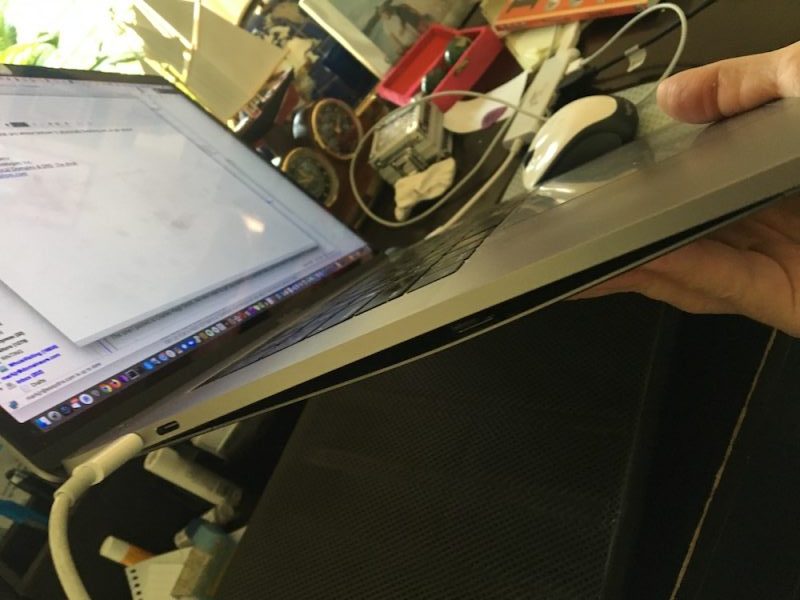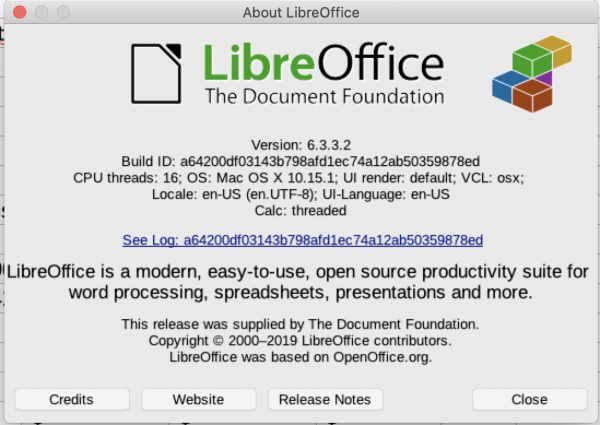
I recently switched laptops, which I was resisting vehemently. But it got to the point where I was considering duct tape, and I was advised to make the move now.
What I wanted to do was hold off buying another Apple MacBook until my Puri.sm Librem phone shipped, and if it was any good I’d try one of their laptops. Another reason was a bit of laziness, every time you switch laptops, even after you restore all your data from Time Machine you still end up having to reinstall or upgrade a lot of apps.
This migration is exacerbated because a new laptop comes with the latest OSX, which these days means Catalina. That’s 64-bit so none of the 32-bit programs will work anymore. Everything that isn’t compatible has to be upgraded to new 64-bit versions which is a bit of a PITA. Some vendors, like Amazon’s Kindle, still don’t even have 64-bit support for Mac yet. I’m stuck using the cloud Kindle reader until they come out with one.
What’s annoying is everybody wants you to switch off of plain old fashioned software, that you buy, for money, and install on your device. Instead they want to move you to some new cloud-based subscription model, which charges you a monthly fee for the same software tools that then keep all of your data in the cloud. Which I loathe. The economics vs the benefits are more than a little skewed in favour of the vendor as your subscription costs outstrip the standalone purchase after about 12 to 18 months (I’m not buying a new laptop every 12 to 18 months. The only reason I bought this one is because our CTO is worried that if the reason the casing is buckling is because battery is swelling, then it could explode).

Recall the new modern adage “cloud just means somebody else’s computer”. Which means you’re under somebody else’s Terms of Service, you’re subject to somebody else’s security readiness (or lack thereof), you’re data is visible by somebody else’s employees and when it all goes bad, your data gets exposed in somebody else’s data breach.
Some of these services still support stand alone software versions, usually a small text link in the bottom corner of the screen, but even then, buying it can still be such a crappy customer experience that, at least in the case of Microsoft Office, it was enough to finally push me over the edge and try an alternative.
First, it was offputting enough that the license I bought for Microsoft Office on my old laptop couldn’t be ported to another hardware device. I thought it could be, I thought I had done exactly that in the past. Who knows, maybe I’m misremembering. But I figured now the shortest path to a solution is to just bite it and buy a new office license for my new laptop. At this point, Microsoft is just coasting on us ostensibly locked-in users….
Microsoft established dominance in operating systems and business applications, and has become a kind of utility, skimming profits from continual upgrades of its vast installed software base.
— Charles Hugh Smith on quasi-monopolies, from Will You Be Richer or Poorer? Profit, Power and A.I. in a Traumatized World
Next, it wants me to login with an Office 365 account, *groan*. I don’t think I even have one of those (why would I?) so I click on “create account” and get the spinning beach ball of death, followed by an eventual time out saying that the remote web server has reset the connection.
This happens repeatedly, until I decide (double *groan*) to call Microsoft Support….
At least I don’t end up spending 40 minutes on hold, the way I would if I called Bell, or Rogers, so there’s that. But the nice lady tells me even though she can find my email address in the database, as having an O365 account, I still need to create one. I never really understand why.
When I tell her every time I try to do that the website hangs, she instructs me to stop trying to do this via signin.live.com (which is where their signup funnel itself is taking me) and instead use account.office.com. When you do this and try to submit the form it tries to load signin.live.com anyway.
This is the tech support equivalent of waving a dead chicken over it. And it doesn’t work. In retrospect it turns out that this is all occurring during the worldwide Office 365 outage that occurred last week which we’re reporting on in #AxisOfEasy.
We’re investigating an issue preventing access to Microsoft 365 services. We’ll provide additional details shortly on https://t.co/AEUj8uAGXl.
— Microsoft 365 Status (@MSFT365Status) November 20, 2019
This again underscores why I don’t like having to rely on everybody else’s computer, a.k.a “the cloud”, to be working just so I can work on a spreadsheet on my own laptop.
I give up and end the call. Within 2 minutes, literally, actually not literally, figuratively, because it probably took even less time…. maybe 30 seconds, I’ve downloaded LibreOffice. They have 64-bit support for OSX Catalina already, and I have it up and running in about 2 clicks. It looks a lot slicker, and functions a lot smoother and is laid out somewhat better than the last time I looked at it, was probably nearly a decade ago. It looks like it’s come a long way.

It’s not that I’m cheap either, I just want something that works according to my preferences, not Microsoft’s.
With this week being Thanksgiving in the US I’ll tell you what I’m thankful for: open source software. This company was built on it, which is why we continue to support it. I took the $319 I was about to spend on an Office license and I donated it to the LibreOffice project, and will just continue to do so every time I have to go through this process. If you want an alternative to Big Tech quasi-monopolies and want to support open source and still get it cheaper (win/win/win) then you don’t have to donate 100% of the cost to the open source challenger. Instead donate just 10%, or 25% or 50%. If everybody starts funneling even a small portion of their software spends to open source challengers it will up-end the economics of software in a meaningful way.
The open source movement continues to present a refreshing contrast to the intersecting gulags of Big Tech with their impenetrable and byzantine “Take it or Leave It” terms of service, their surveillance capitalism (which isn’t even capitalist as much as it is monetized psyops and commercialized espionage) and their myriad security lapses.
It is the one paradigm that seems impervious from co-option, because even when 800lb gorillas purchase an open source project, it either stays open source, or else it forks into something that retains the ethos. Witness Oracle’s inheritance of MySQL via their acquisition of Sun Microsystems. It’s still open source, technically, but when Oracle began adding proprietary modules, it forked into MariaDB.
One fact that I think is missed by a lot of people, even advocates of it, is that Bitcoin is open source money. The same goes for crypto-currencies in general and the entire movement toward decentralization.
When you add it all up it seems like George Gilder may be proven prescient (once again) in his Life After Google. We’re approaching a stage, I think, where the disruptors are beginning to face the prospect of being themselves, disrupted. It’s coming from open source, decentralized tech that puts the user in control and where value is derived from providing tools and support for accomplishing the end-users objectives, instead locking users into walled gardens and harvesting them by mining their data.


There’s a MacBook Battery replacement program. https://support.apple.com/13inch-macbookpro-battery-replacement
Your Kindle problem would be solve the same way you solved your Office problem—don’t support a system that uses DRM and proprietary formats. Get open-format ePub files that can be read anywhere.
Easier said than done since most publishers don’t release their works in that format.
The entire world outside of Amazon is primarily epub (or pdf for print-exact publishing like technical textbooks). Most publishers do release epubs, just look at kobo (walmart’s ebook provider) and overdrive.
Amazon’s formats are proprietary wrappers or modifications to open (original) mobi, epub, and pdf formats. All quality publishers start with epubs (or pdfs) because you can’t edit Amazon’s formats directly. Non-technical self-published authors don’t start with kindle formats either; if they don’t use something like Vellum or Scrivener, they typically start with msword and use Amazon’s “Kindle Create” or kindlegen to convert doc to amazon formats.
Amazon’s behavior of refusing to allow selling epubs or pdfs directly, and refusing to support epub on kindles, should be considered anticompetitive behavior.
Calibre will convert drm-free amazon formats to epub or pdf, and it will (with the right plugin) strip most types of drm including Amazon’s.
Calibre and save as epub.
Your criticism, or blame, of DRM seems misguided. DRM exists , at least in part, to protect the artists and other creators and provide you with a content. Those people deserve to be paid. When I create artistic content I want to be paid for it – just because I happen to like what I do doesn’t mean I should give it away.
DRM is also awful on ePub ebooks, it locks you into Adobe’s system which is more compatible but still prevents the reader to use the software or device that he prefers. I once had to reset my ebook reader while traveling and was therefore locked out of my DRM protected eBooks. Never again. DRM doesn’t prevent piracy either, it’s easy to remove. The sensible approach is to use individual watermarks which can be traced back to the buyer if he should upload the book illegally, but doesn’t restrict him to any proprietary software. Luckily, this is what most publishers whose books I’m interested in do in Germany.
You are messing DRM with Copyright. Copyright was started to credit the creators, but DRM started to control users’ devices and restrict them.
Kindle does have a 64 bit version for Mac now.
Really? I’m not seeing it.
Premise: I agree with all your points.
Inquiry: Desktop apps require a desktop computer. Cloud apps can be accessed from any device running any OS. Have you thought of running a self-hosted cloud office application, e.g. the wonderful (and IMO better than LibreOffice) OnlyOffice?
Website: https://www.onlyoffice.com
Repository: https://github.com/ONLYOFFICE/DocumentServer
Yes, I totally agree that Libreoffice is wonderful. When my desktop computer self destructed, an I was forced to replace it, I started to load the Microsort Office program that I had paid for a few years back. Oh, no! That is no longer going to work! I was so angry, I researched free programs and found Libreoffice. I couldn’t be happier.
I think Libreoffice is just fine and 100% reliable. We should donate to the Document Foundation to make it even better. We drink now Fritz Cola, google with Ecosia, browse with chrome and write with Libreoffice.
10 years ago it was coca cola, google, Internet Explorer, MS Office
Browse withGoogle Chrome, and “google with Ecosystem”.
No discrepancy there then…
Just another some article that I read in a past 20 years, and MS is still there, stronger then ever…
So is measles.
Facts. People act as if Microsoft is the only one doing things like this. It’s what everyone is doing now, people just hate because it’s Microsoft. Hope he has luck with this other crap lol.
You don’t need to purchase O365 if you had a recent version of Office, you sign in and you download the 64 bit version….OR you can just buy Office without the monthly subscription. NEVER listen to Microsoft. But, yes, LibreOffice is nice, it just doesn’t have all of the features
Getting a MAC, struggling with incompatible software that was compatible a week ago, but complaining about a software company that asks you to create an account so you can manage your license. Just rewind and don’t buy hardware from a marketing company out to fleece you every 4 months.
Facts. Smh 🤦🏾♂️ people complain for no reason sometimes.
I wanted to print on envelopes, I can’t?
The only problem with LibreOffice is how abysmally slow it is. If time isn’t an issue, sure I guess it’s ok. But Office is so very much faster, and that makes it worth it for me.
LibreOffice worked like a charm, I haven’t used Microsoft Office since ms office 2007. It took me a few moments to get used to it. At times it’s slow, but the upside no AI, or Microsoft peeping at the docs.
But hey we make due with what we got. I plan to migrate to Linux, MX Linux, away from Windows 10.
I have been considering installing Libre Office.
Since reinstalling my laptop I haven’t installed office (I also can’t figure out what licence I was using, I thought it was linked to my MS account).
I have considered trying Libre Office, but the one thing I need is Mail Merge fields, and I don’t know if it has those.
I’m rapidly switching to open source: Linux, LibreOffice,….
However, I had to buy a Windows machine lately and had a similar, but more disturbing experience during the verification process for Win10. As happened to you, I needed to log in to my Microsoft Account, which is somewhat reasonable. However, the system automatically set up my user name and password for the machine using part of my MS login name and my MS account password. In other words, the password for my machine is on an MS server. I don’t care if the password is hashed, I consider this a major security hole. Luckily, there is a way to set up a user account that doesn’t require using an MS account, so I quickly set that up and deleted the account set up by MS.
Between this obliviousness to security and the backdoor MS has to remotely update Win10, I have no confidence in their products anymore.
Hence, the switch to Linux and open source.
PS. If you try to set up a dummy, one-time use MS account, don’t bother with the email address a$$hole@f***you.com: it was already taken…
I had the same experience with office and several win10 crashes. I am switching to linux mint. Mint works great it doesn’t shut down when you’re in the middle of drawing or a spread sheet.
They are de facto standards as an application. As data formats, governments and large companies required them to become available under formal standards. After doing a lot of outright sleazy things, Office format (which is basically xml files wrapped in a zip file) is now a formal standard. When companies like Microsoft step around interoperability, they should be severely chastized and then punished, which apparently only governments and large companies have the wherewithal to do.
They are de facto standards as an application. As data formats, governments and large companies required them to become available under formal standards. After doing a lot of outright sleazy things, Office format (which is basically xml files wrapped in a zip file) is now a formal standard. When companies like Microsoft step around interoperability, they should be severely chastized and then punished, which apparently only governments and large companies have the wherewithal to do.